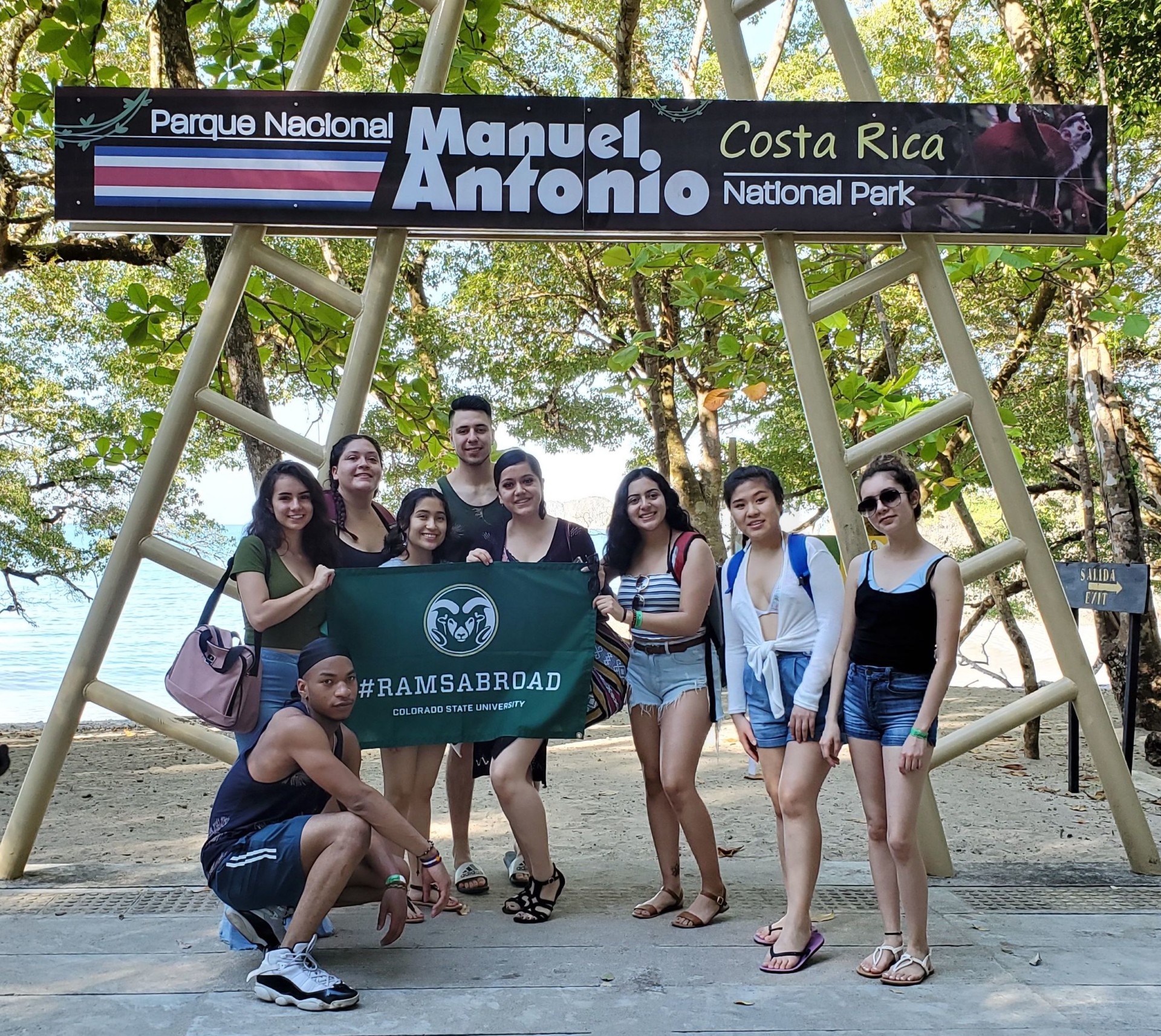
The First-Generation Global Experience took CSU students, including Karen Guadarrama, to Costa Rica in January 2020. Photo courtesy Karen Guadarrama
It’s no surprise that the COVID-19 pandemic caused a dramatic decline in the number of Colorado State University students who were able to go or stay abroad to study compared to previous years. However, there is a silver lining: Data show that a higher percentage of Pell recipients, first-generation college students, and students of color went abroad during the 2019-20 academic year than ever before.
A big reason for this increase was the advocacy and implementation of the university’s Global Access Award. This award especially empowers many students who might not have thought that an Education Abroad experience was for them or that they could afford it. Likewise, several strategic programs were created to give students from distinct identity groups more confidence and connections to go abroad. Several of these programs were created with leadership from Student Diversity Programming and Support units. Karen Guadarrama was one such student to benefit from this award and strategic programming.
Guadarrama, a fourth-year, first generation college student with a double major in social work and human development and family studies, would not have studied overseas if it wasn’t for the Global Access Award that paid for her program in full.
“I come from a low-income background; my father is the breadwinner for our home and my mother is a housewife, so I could not expect them to help with any expenses. And at the time I had no employment and would not have been able to afford [studying abroad] out of pocket,” explains Guadarrama. “If it wasn’t for the Global Access Award, I would not have been able to go on the trip.”
First-Gen Global Experience
Guadarrama went on the First Generation Global Experience program in Costa Rica in January 2020. During her program, she assisted with community service, took Spanish and dance classes, and stayed with a host family, which helped her not miss home and her own family so much.
“I loved everything about the experience, but I liked most that we stayed with host families. Staying with a host family made me feel more welcome and helped with my homesickness,” notes Guadarrama. “Having this made me feel even more at home, and I really enjoyed having had dinner with all the families together and spending afternoons with the family as a whole as it made me feel like if I was back home. Family is one of my biggest values in life and I felt that being with the host families allowed me to get the best experience abroad.”
Thanks to the Global Access Award and her study abroad experience, Guadarrama has high hopes to travel overseas again in the future.
History of the award
The Global Access Award owes its existence and success to several people from across CSU, including Tae Nosaka, associate executive director of the Collaborative for Student Achievement; Tom Biedscheid, assistant vice president for Enrollment and Access; and Oscar Felix, now assistant professor in the School of Education, as well as the Global Access Award Committee and International Programs’ Education Abroad unit.
“I vividly remember, a few years ago, when I met with Oscar to talk about how we might target some scholarship dollars we had available,” remembers Biedscheid. “My intention was focusing on a new way to support student success. With Oscar’s extensive personal education abroad experience, he immediately thought about offering the same experience to first-generation, low-income and students of color.”
“There have historically been so many barriers to studying abroad for these students and finances sit at the top of the list, he continues. “Core to our mission in financial aid, we never want finances to be the reason a student is barred from an educational opportunity at CSU.”
There’s more to the award, however.
“The Global Access Award started as an idea to provide much more than need-based monetary support for education abroad experiences,” according to Felix. “The award is really a program in which future global scholars are engaged in activities that provide information, motivation, student panels, and technical support to make the educational abroad experience a reality.”
Layers of support
To bring awareness of the award and to layer the supports to students, the Global Access Award Committee was created.
“The Global Access Award Committee provides holistic support to Global Access Award-eligible students,” explains Vanessa Hayward, a member of the committee and senior Education Abroad coordinator for incoming exchange. “Through one-on-one education abroad and financial aid advising, pre-departure group community dialogues, and post-return reflection sessions, we want to create a successful and impactful education abroad experience for our award recipients. They return with the skills needed to lead change, including improved problem solving and critical thinking skills, enhanced awareness of how our various and intersecting identities play out in a global context, and increased engagement in their role as global citizens.”
The impact of the Global Access Award and the continued advocacy for making study abroad opportunities accessible to more students will continue this trend toward greater diversity in students participating in study abroad experiences when global travel is advisable again.
To learn more about the Global Access Award, you can find information on the Education Abroad webpage.